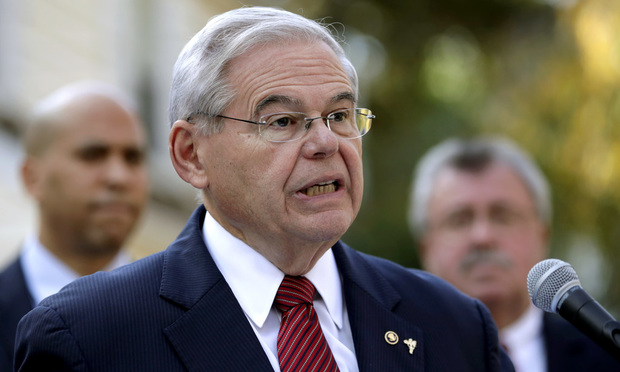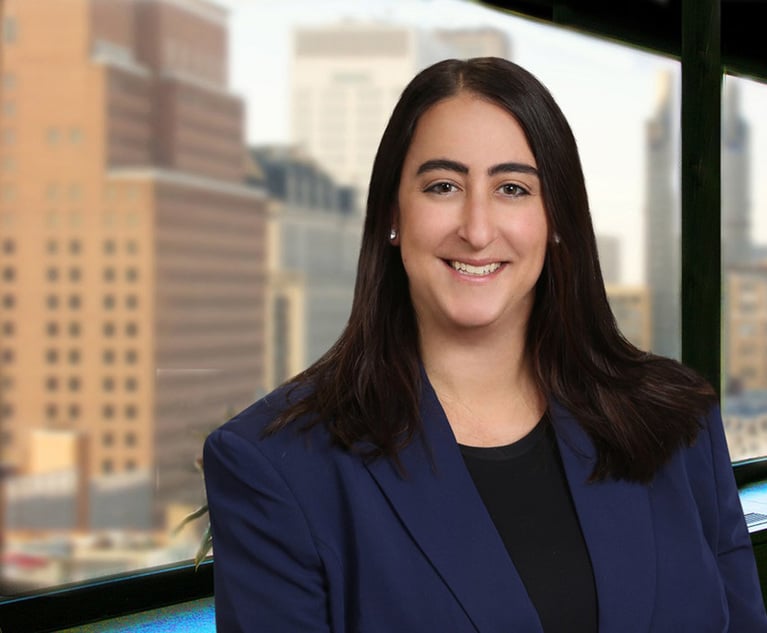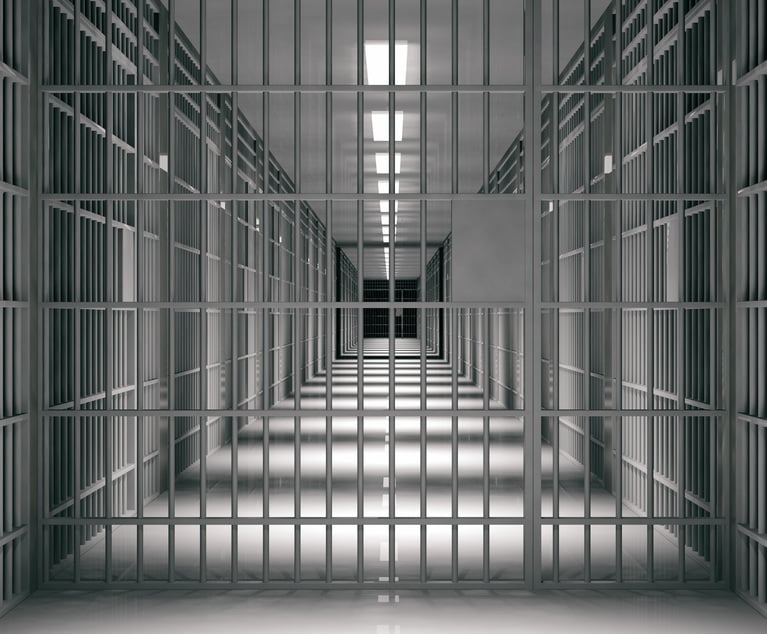Amid Deadlock and Juror Remarks, Is Menendez Trial Foundering?
After some surprising twists Monday in the corruption trial of U.S. Sen. Bob Menendez, D-New Jersey, some trial watchers are not optimistic about whether jurors will be able to reach a unanimous verdict.
November 13, 2017 at 07:07 PM
12 minute read
 U.S. Sen. Bob Menendez.
U.S. Sen. Bob Menendez. After some surprising twists Monday in the corruption trial of U.S. Sen. Bob Menendez, D-New Jersey, some trial watchers are not optimistic about whether jurors will be able to reach a unanimous verdict.
First, four jurors and three alternates raised their hands when U.S. District Judge William Walls of the District of New Jersey asked if they had heard or read comments in the media by a juror who was excused for a vacation on Nov. 9, Evelyn Arroyo-Maultsby.
Later in the day, the jury sent the judge a note saying they were hopelessly deadlocked. Menendez's lawyer, Abbe Lowell, asked for a mistrial. Walls sent the jury home early and instructed them to try again on Tuesday.
The combination of factors, coming nine weeks into the corruption trial of Menendez and co-defendant Salomon Melgen, makes the chance of a mistrial appear more likely, said some trial observers.
“I'm not sure if the ship can be righted. It's a very strange circumstance, that, perhaps, could have been avoided with instructions to the departing juror,” said Mala Harker, a former federal prosecutor turned white-collar defense lawyer at Friedman Kaplan Seiler & Adelman in Newark.
On Monday, Walls seated an alternate to take the place of Arroyo-Maultsby, who was excused because of vacation plans. The jury was instructed to begin deliberating from square one with the new juror.
“There is a chance that they will, after some hard work putting their heads together, that they can come to a meeting of the minds,” said Harker. “The problem, as I see it, is the potential taint issue—the dismissed juror, making statements that were widely reported in the media. That in the ether has influenced the course of things as they are now going forward with the new jury—that is the most unusual thing that has happened.”
“I think [the departing juror's comments are] being felt in making the deliberation more complicated than they might otherwise have been. It's a tricky case. I think that oddity in the proceedings really does complicate things,” Harker said.
Walls interviewed those jurors and alternates who were exposed to the departing juror's comments but concluded that the issue would not infect the proceedings.
“It certainly seems headed for a mistrial at this point,” said Kevin Marino of Marino, Tortorella & Boyle in Chatham, another former federal prosecutor.
“I think it's not surprising that it would be a hung jury,” Marino said. “I think the government had a fairly unusual theory of prosecution, the stream of benefits theory, with the constraints imposed by McDonnell.”
He was referring to McDonnell v. United States, a 2016 Supreme Court ruling that narrowed the definition of “official acts” under federal bribery laws.
The excused juror's comments in the media were “highly improper” and “only contribute to the confusion here,” Marino said. “I don't know how that could stand on appeal, once the jury says it has heard media accounts. That's admitting to violating your oath.”
The jurors' note telling the judge they are deadlocked does not preclude at least a partial verdict, noted Robert Mintz, a former federal prosecutor at McCarter & English in Newark.
“I've seen juries who sent out similar notes and ultimately were able to reach a unanimous verdict on at least some of the counts. But it certainly may be an indication that this jury will be unable to reach a verdict and the judge will have to declare a mistrial,” Mintz said.
Mintz didn't see the exposure to the excused juror's comments problematic because she probably made similar statements in the jury room. Judges typically tell a jury to continue deliberating after hearing for the first time that jurors are deadlocked, but if the jury reports being deadlocked a second time, it's more likely that a mistrial will be declared, Mintz said.
Justin Loughry, a criminal defense lawyer at Loughry and Lindsay in Camden, suggested that a divided jury might be an indication of weakness in the prosecution's case.
When asked if the trial could get back on track, Loughry said, “Maybe it is on track. Lots of people talk about what happens when cases can't be resolved by juries. Sometimes that's a sign of the system functioning.”
 U.S. Sen. Bob Menendez.
U.S. Sen. Bob Menendez. After some surprising twists Monday in the corruption trial of U.S. Sen. Bob Menendez, D-New Jersey, some trial watchers are not optimistic about whether jurors will be able to reach a unanimous verdict.
First, four jurors and three alternates raised their hands when U.S. District Judge William Walls of the District of New Jersey asked if they had heard or read comments in the media by a juror who was excused for a vacation on Nov. 9, Evelyn Arroyo-Maultsby.
Later in the day, the jury sent the judge a note saying they were hopelessly deadlocked. Menendez's lawyer, Abbe Lowell, asked for a mistrial. Walls sent the jury home early and instructed them to try again on Tuesday.
The combination of factors, coming nine weeks into the corruption trial of Menendez and co-defendant Salomon Melgen, makes the chance of a mistrial appear more likely, said some trial observers.
“I'm not sure if the ship can be righted. It's a very strange circumstance, that, perhaps, could have been avoided with instructions to the departing juror,” said Mala Harker, a former federal prosecutor turned white-collar defense lawyer at
On Monday, Walls seated an alternate to take the place of Arroyo-Maultsby, who was excused because of vacation plans. The jury was instructed to begin deliberating from square one with the new juror.
“There is a chance that they will, after some hard work putting their heads together, that they can come to a meeting of the minds,” said Harker. “The problem, as I see it, is the potential taint issue—the dismissed juror, making statements that were widely reported in the media. That in the ether has influenced the course of things as they are now going forward with the new jury—that is the most unusual thing that has happened.”
“I think [the departing juror's comments are] being felt in making the deliberation more complicated than they might otherwise have been. It's a tricky case. I think that oddity in the proceedings really does complicate things,” Harker said.
Walls interviewed those jurors and alternates who were exposed to the departing juror's comments but concluded that the issue would not infect the proceedings.
“It certainly seems headed for a mistrial at this point,” said Kevin Marino of Marino, Tortorella & Boyle in Chatham, another former federal prosecutor.
“I think it's not surprising that it would be a hung jury,” Marino said. “I think the government had a fairly unusual theory of prosecution, the stream of benefits theory, with the constraints imposed by McDonnell.”
He was referring to McDonnell v. United States, a 2016 Supreme Court ruling that narrowed the definition of “official acts” under federal bribery laws.
The excused juror's comments in the media were “highly improper” and “only contribute to the confusion here,” Marino said. “I don't know how that could stand on appeal, once the jury says it has heard media accounts. That's admitting to violating your oath.”
The jurors' note telling the judge they are deadlocked does not preclude at least a partial verdict, noted Robert Mintz, a former federal prosecutor at
“I've seen juries who sent out similar notes and ultimately were able to reach a unanimous verdict on at least some of the counts. But it certainly may be an indication that this jury will be unable to reach a verdict and the judge will have to declare a mistrial,” Mintz said.
Mintz didn't see the exposure to the excused juror's comments problematic because she probably made similar statements in the jury room. Judges typically tell a jury to continue deliberating after hearing for the first time that jurors are deadlocked, but if the jury reports being deadlocked a second time, it's more likely that a mistrial will be declared, Mintz said.
Justin Loughry, a criminal defense lawyer at Loughry and Lindsay in Camden, suggested that a divided jury might be an indication of weakness in the prosecution's case.
When asked if the trial could get back on track, Loughry said, “Maybe it is on track. Lots of people talk about what happens when cases can't be resolved by juries. Sometimes that's a sign of the system functioning.”
This content has been archived. It is available through our partners, LexisNexis® and Bloomberg Law.
To view this content, please continue to their sites.
Not a Lexis Subscriber?
Subscribe Now
Not a Bloomberg Law Subscriber?
Subscribe Now
NOT FOR REPRINT
© 2025 ALM Global, LLC, All Rights Reserved. Request academic re-use from www.copyright.com. All other uses, submit a request to [email protected]. For more information visit Asset & Logo Licensing.
You Might Like
View All
On the Move and After Hours: Meyner and Landis; Cooper Levenson; Ogletree Deakins; Saiber
3 minute read
AstraZeneca Files Flurry of Lawsuits to Protect Cancer Treatment Drug
3 minute read
In 2-1 Ruling, Court Clears Way for Decade-Old Wrongful Imprisonment Suit
5 minute read
Appellate Division Rejects Third Circuit Interpretation of NJ Law, Says No Arbitration for Insurance Fraud
4 minute readTrending Stories
- 1'It's Not Going to Be Pretty': PayPal, Capital One Face Novel Class Actions Over 'Poaching' Commissions Owed Influencers
- 211th Circuit Rejects Trump's Emergency Request as DOJ Prepares to Release Special Counsel's Final Report
- 3Supreme Court Takes Up Challenge to ACA Task Force
- 4'Tragedy of Unspeakable Proportions:' Could Edison, DWP, Face Lawsuits Over LA Wildfires?
- 5Meta Pulls Plug on DEI Programs
Who Got The Work
Michael G. Bongiorno, Andrew Scott Dulberg and Elizabeth E. Driscoll from Wilmer Cutler Pickering Hale and Dorr have stepped in to represent Symbotic Inc., an A.I.-enabled technology platform that focuses on increasing supply chain efficiency, and other defendants in a pending shareholder derivative lawsuit. The case, filed Oct. 2 in Massachusetts District Court by the Brown Law Firm on behalf of Stephen Austen, accuses certain officers and directors of misleading investors in regard to Symbotic's potential for margin growth by failing to disclose that the company was not equipped to timely deploy its systems or manage expenses through project delays. The case, assigned to U.S. District Judge Nathaniel M. Gorton, is 1:24-cv-12522, Austen v. Cohen et al.
Who Got The Work
Edmund Polubinski and Marie Killmond of Davis Polk & Wardwell have entered appearances for data platform software development company MongoDB and other defendants in a pending shareholder derivative lawsuit. The action, filed Oct. 7 in New York Southern District Court by the Brown Law Firm, accuses the company's directors and/or officers of falsely expressing confidence in the company’s restructuring of its sales incentive plan and downplaying the severity of decreases in its upfront commitments. The case is 1:24-cv-07594, Roy v. Ittycheria et al.
Who Got The Work
Amy O. Bruchs and Kurt F. Ellison of Michael Best & Friedrich have entered appearances for Epic Systems Corp. in a pending employment discrimination lawsuit. The suit was filed Sept. 7 in Wisconsin Western District Court by Levine Eisberner LLC and Siri & Glimstad on behalf of a project manager who claims that he was wrongfully terminated after applying for a religious exemption to the defendant's COVID-19 vaccine mandate. The case, assigned to U.S. Magistrate Judge Anita Marie Boor, is 3:24-cv-00630, Secker, Nathan v. Epic Systems Corporation.
Who Got The Work
David X. Sullivan, Thomas J. Finn and Gregory A. Hall from McCarter & English have entered appearances for Sunrun Installation Services in a pending civil rights lawsuit. The complaint was filed Sept. 4 in Connecticut District Court by attorney Robert M. Berke on behalf of former employee George Edward Steins, who was arrested and charged with employing an unregistered home improvement salesperson. The complaint alleges that had Sunrun informed the Connecticut Department of Consumer Protection that the plaintiff's employment had ended in 2017 and that he no longer held Sunrun's home improvement contractor license, he would not have been hit with charges, which were dismissed in May 2024. The case, assigned to U.S. District Judge Jeffrey A. Meyer, is 3:24-cv-01423, Steins v. Sunrun, Inc. et al.
Who Got The Work
Greenberg Traurig shareholder Joshua L. Raskin has entered an appearance for boohoo.com UK Ltd. in a pending patent infringement lawsuit. The suit, filed Sept. 3 in Texas Eastern District Court by Rozier Hardt McDonough on behalf of Alto Dynamics, asserts five patents related to an online shopping platform. The case, assigned to U.S. District Judge Rodney Gilstrap, is 2:24-cv-00719, Alto Dynamics, LLC v. boohoo.com UK Limited.
Featured Firms
Law Offices of Gary Martin Hays & Associates, P.C.
(470) 294-1674
Law Offices of Mark E. Salomone
(857) 444-6468
Smith & Hassler
(713) 739-1250






